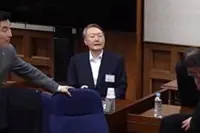SEOUL: No thanks to his “xie xie” gaffe from a year ago, former opposition leader Lee Jae-myung, who is widely regarded as the forerunner in South Korea’s snap presidential election on June 3, is now in a bit of a tight spot.
In the run-up to the country’s April 2024 general election, in an attempt to disparage then-president Yoon Suk Yeol’s tightening alliance with the United States and Japan which had invited criticism from China, Lee had said Seoul could avoid antagonising Beijing further, especially over Taiwan Strait tensions by simply saying xie xie, or “thanks” in Mandarin, to China and Taiwan.
These remarks have come back to haunt Lee as simmering tensions between South Korea and China bubbled to the surface recently over Chinese-built structures in the jointly managed West Sea Provisional Maritime Zone (PMZ) where both countries’ exclusive economic zones overlap.
The two countries met at a high-level dialogue in Seoul on Wednesday (April 23) to discuss China’s unilateral installation of three structures in the West Sea PMZ between 2018 and 2024, amid rumours that China was preparing for a fourth structure.
South Korea, worried that the structures are China’s way of staking its claim in the PMZ, is demanding that the existing structures be relocated outside of the PMZ.
But the Chinese are claiming that the structures are for aquaculture purposes and unrelated to sovereignty or maritime boundary delimitation.
Failing to reach a consensus at the meeting, both sides have agreed to hold the next round of talks in China at a mutually convenient time.
Amid the rising tensions, Lee’s political rivals are lampooning his previous pro-China comments in a bid to discredit the presidential hopeful, who is known for his strength in domestic politics but weakness in foreign policy.
At the time when he made the comments, critics and political rivals had slammed the lawyer-turned-politician’s lack of foreign policy acumen for not recognising the impact of the situation in the nearby Taiwan Strait on the Korean Peninsula’s security and South Korea’s economy.
Tension is high between China, which claims the island as its territory, and Taiwan, which wants to maintain its de facto independence.
Anti-Chinese sentiment is on the rise in South Korea, where a poll released in March found that respondents in their 20s and 30s rated China’s favourability at just 30 out of 100, barely registering two points above North Korea.
Yoon’s impeachment saga has also led to the spread of anti-Chinese sentiment among far-right conservatives, as both the former president and members from his ruling People Power Party (PPP) have alleged Chinese involvement in election fraud in South Korea as one of the key factors that had triggered Yoon to declare martial law on Dec 3.
Yoon claims that martial law would allow him to launch a thorough investigation into election fraud as the country’s election commission is controlled by the judiciary during peacetime.
Yoon was impeached for his declaration of martial law on Dec 3, 2024 which was deemed illegal, leading to the snap presidential election being called for June 3.
Research fellow Dr Lee Dong-gyu from the Asan Institute for Policy Studies in Seoul told The Straits Times that the conservatives are expected to continue to leverage on the anti-Chinese sentiment to make sure that Lee is disadvantaged by his pro-China stance.
Former PPP chief Han Dong-hoon, who is among four candidates vying for the PPP ticket, said in a social media post on April 21 that “the ‘West Sea Project’ cannot be stopped by just giving China a ‘xie xie’,” in an apparent dig at Lee.
Han went on to add that the next president “must accurately understand the Trump administration’s Asia priority policy” which gives no room for Lee’s “fake diplomacy and fake security policies”.
Amid the brickbats, Lee, who is from the opposition Democratic Party (DP), has outwardly kept a light touch on foreign policy pledges although he has rolled out numerous domestic policy pledges, including a bold 100 trillion won (S$91.9 billion) pledge on artificial intelligence (AI) investment.
In a televised debate on April 23 with his party rivals vying for the party’s ticket to the presidential elections, Lee said that he is a champion of “pragmatic diplomacy” or pursuing foreign policy based on national interests, without going into specifics.
His election team’s policy chief told reporters after the debate that it was a “strategic silence” to avoid “exposing operations and strategies” ahead of the official presidential election campaign period which begins on May 12.
But Asan Institute’s Dr Lee thinks that the “strategic silence” adopted by Lee’s camp, is more of a “careful move to win the election”.
“He needs to avoid providing conservatives with ammunition and win over the moderate voters with a perception that he will sustain cordial relations with both the US and Japan,” said Dr Lee.
He added that domestic pressure over security concerns related to North Korea’s close ties with Russia and Pyongyang’s military provocations, would “demand that he either maintain or even strengthen the South Korea-US alliance and security cooperation with the US and Japan”.
King’s College London’s international relations professor Ramon Pacheco Pardo shares a similar view that if elected, Lee is likely to focus on cooperation with the US and Japan and be wary of China “given the current state of geopolitics in North-east Asia and globally”.
He added that liberal candidates “tended to be labelled as pro-China even though that is not true”.
“I think that DP is ultimately pro-South Korea, rather than pro-China or anti-Japan,” he told ST.
Since Yoon’s martial law debacle, Lee has consistently led in opinion polls as the most favoured potential candidate for the presidential election, with a wide lead over other prospective candidates.
In the latest Gallup Korea poll based on 1,000 respondents released on April 25, Lee has maintained his lead at 38 per cent, while Han came in a distant second at eight per cent.
While his political rivals have attempted to discredit him by attacking his lack of foreign policy acuity, experts believe that Lee’s biggest weaknesses in his campaign lie elsewhere.
“I think that his main weaknesses during the campaign will be his court cases and some of his more populist remarks, rather than his foreign policy,” said Prof Pacheco Pardo, adding that Lee would still have time to define his foreign policy stance when campaigning officially begins.
Lee, who was acquitted of election law violation charges on March 26 by Seoul’s High Court, faces a last hurdle as prosecutors have filed an appeal to the Supreme Court.
With the Supreme Court holding deliberations in unprecedented quick succession on April 22 and 24, speculation is rife that the Court is heading for a final verdict before the election on June 3.
International politics professor Mason Richey from Hankuk University of Foreign Studies said Lee’s biggest strength lies in the conservatives’ candidates being “saddled with the legacy of Yoon’s martial law (declaration) and (subsequent) impeachment”.
“Lee’s campaign ultimately runs on the idea that he isn’t Yoon Suk Yeol,” he said. - The Straits Times/ANN





